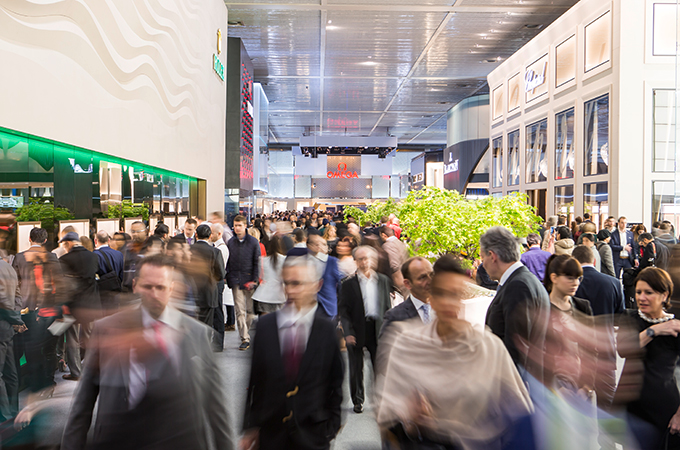Wed, Mar 22, 2017
The 100th edition of Baselworld opened its doors today with watchmakers, jewellers, buyers and sellers all searching for signs of a revival in the watch and jewellery market.
Considered a bellwether of the health of the industry, this year’s edition is smaller than the previous year and is being held against the backdrop of a continued downturn in the global luxury goods market.
In 2016, Swiss watch exports shrank 9.9 per cent, after contracting 3.3 per cent a year earlier and the trend has continued in 2017, with global exports of Swiss watches sliding ten per cent in February to CHF1.5 billion ($1.5 billion), according to the Federation of the Swiss Watch Industry (FHS).
Now in its 100th edition, this year’s fair has seen a year-over-year decline in exhibitors of 13.3 per cent, from 1,500 to 1,300. Of these, 220 are Swiss brands.
However, the organisers said they had opted for a smaller show “by choice” as a reflection of “quality over quantity”.
The world’s biggest watch and jewellery show kicked off with an inaugural press conference which was streamed live across the world.
Rene Kamm, CEO of the MCH Group, said that Baselworld has “undoubtedly contributed significantly to our group’s success and global standing.”
Sylvie Ritter, Managing Director of Baselworld, welcomed all media representatives and said that their presence in such large numbers was testimony to the high-level of interest they brought to the show.
Ritter said Baselworld was a success because the show because it continued to reinvent, renew, adapt, modernise and continuously transform, reflecting an “ever-changing market.”
Acknowledging that the past 12 months have been difficult and have compelled some players to leave the industry, she said that Baselworld “has transformed to reflect the global market”.
“This process of transformation will always have to favour quality over quantity. The result being that we chose to refuse some exhibitors for this year’s show,” she said.
Ritter said Baselworld aimed to reflect the state of the market, meet the expectations of its players and therefore “to be continually changing”.
“New adaptations have allowed us to offer independent watchmakers, previously in the Palace, a space of first choice in Hall 1. The creation of this space, called Les Ateliers, has enabled us to meet the growing demand in this sector.”
She also revealed another novelty in Hall1 called the Design Lab - a space dedicated to designers, mainly in jewellery, featuring unique innovative pieces and avant-garde creations.
Eric Bertrand, President of the Exhibitors’ Committee, summed up the value of the show saysing: “We know from experience that the new collections presented as a world premiere at Baselworld will make the news for the next 12 months and that the trends that emerge here will spread throughout the world.”
He said the upshot of the current downturn was a consolidation of the market that would benefit the entire industry once the recovery has begun.
“The recovery will enable the best-armed players to gain market share and be more successful than ever before,” he said.
Francois Thiebaud, President of the Swiss Exhibitors’ Committee, noted that in 2016, Swiss watch exports were 9.88 per cent lower than in the previous year. He pointed out that the last quarter of 2016 saw a slight improvement and recalled that the global political and economic context remained difficult and that watch exports had also been hit by the rise of the Swiss franc in January 2015.
Thiebaud also underlined the evolution of Baselworld over the last 100 years by recollecting that at the first show in 1917, only 29 Swiss brands exhibited, whereas in 2017, as many as 220 Swiss brands are showcasing their novelties.
Baselworld opens its doors to the public tomorrow and runs until March 30 in Basel, Switzerland.



















